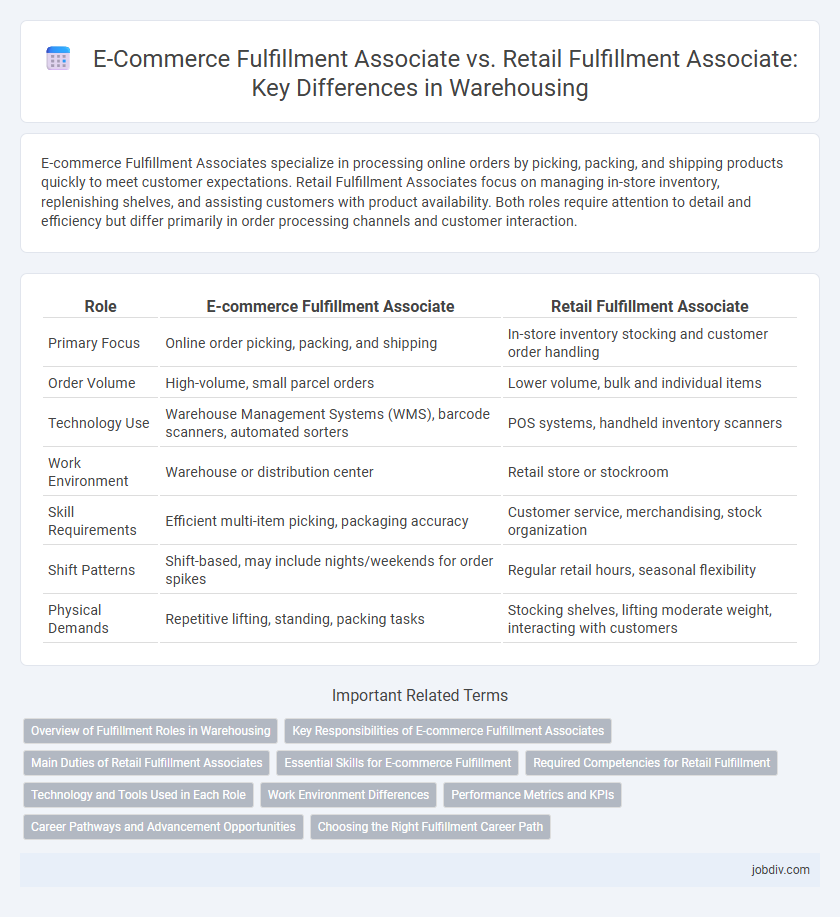E-commerce Fulfillment Associates specialize in processing online orders by picking, packing, and shipping products quickly to meet customer expectations. Retail Fulfillment Associates focus on managing in-store inventory, replenishing shelves, and assisting customers with product availability. Both roles require attention to detail and efficiency but differ primarily in order processing channels and customer interaction.
Table of Comparison
| Role | E-commerce Fulfillment Associate | Retail Fulfillment Associate |
|---|---|---|
| Primary Focus | Online order picking, packing, and shipping | In-store inventory stocking and customer order handling |
| Order Volume | High-volume, small parcel orders | Lower volume, bulk and individual items |
| Technology Use | Warehouse Management Systems (WMS), barcode scanners, automated sorters | POS systems, handheld inventory scanners |
| Work Environment | Warehouse or distribution center | Retail store or stockroom |
| Skill Requirements | Efficient multi-item picking, packaging accuracy | Customer service, merchandising, stock organization |
| Shift Patterns | Shift-based, may include nights/weekends for order spikes | Regular retail hours, seasonal flexibility |
| Physical Demands | Repetitive lifting, standing, packing tasks | Stocking shelves, lifting moderate weight, interacting with customers |
Overview of Fulfillment Roles in Warehousing
E-commerce Fulfillment Associates specialize in processing and shipping online orders with a focus on accuracy, speed, and handling diverse product SKUs. Retail Fulfillment Associates are responsible for preparing store-ready merchandise, including inventory replenishment and coordinating in-store pickups. Both roles play essential parts in warehouse operations, optimizing supply chain efficiency and customer satisfaction.
Key Responsibilities of E-commerce Fulfillment Associates
E-commerce Fulfillment Associates manage online order processing, picking, packing, and shipping to ensure timely delivery and accurate inventory tracking. They utilize warehouse management systems (WMS) and barcode scanners to maintain real-time stock updates and optimize order accuracy. Their role is crucial in handling high-volume, often customized orders with attention to detail for customer satisfaction and efficient supply chain operations.
Main Duties of Retail Fulfillment Associates
Retail Fulfillment Associates primarily manage in-store inventory, ensuring shelves are stocked accurately and products are organized for easy customer access. Their duties include processing incoming shipments, labeling items, and coordinating with sales staff to maintain optimal stock levels. They also assist customers with product inquiries, facilitating a seamless shopping experience that directly impacts store performance.
Essential Skills for E-commerce Fulfillment
E-commerce Fulfillment Associates require proficiency in inventory management software, order accuracy, and quick adaptation to fluctuating demand patterns driven by online sales trends. Expertise in packaging for shipping durability, familiarity with digital tracking systems, and efficient multitasking in high-volume environments are critical for timely dispatch and customer satisfaction. Strong communication skills and problem-solving abilities support seamless coordination across warehouses, couriers, and online platforms, ensuring optimal fulfillment performance.
Required Competencies for Retail Fulfillment
Retail Fulfillment Associates require strong customer service skills, inventory management expertise, and proficiency in operating point-of-sale systems. They must demonstrate attention to detail in order processing, accuracy in stock replenishment, and the ability to work in fast-paced retail environments. Competencies such as effective communication, problem-solving, and teamwork are essential to ensure seamless retail order fulfillment and customer satisfaction.
Technology and Tools Used in Each Role
E-commerce Fulfillment Associates utilize advanced warehouse management systems (WMS), automated picking tools, and barcode scanners to handle high-volume, time-sensitive orders efficiently. Retail Fulfillment Associates rely more on point-of-sale (POS) integration, inventory management software tailored for in-store stock replenishment, and handheld devices for real-time shelf updates. Both roles harness technology to optimize accuracy and speed, but e-commerce fulfillment emphasizes scalability and automation, while retail fulfillment focuses on seamless customer experience and store operations.
Work Environment Differences
E-commerce Fulfillment Associates typically operate in large, automated warehouses with high-volume order processing and rapid shipping deadlines, emphasizing accuracy and speed in online order picking, packing, and shipping. Retail Fulfillment Associates often work in store-based environments with direct customer interaction, handling both in-store inventory management and fulfillment of online orders, requiring multitasking between sales support and order preparation. The e-commerce role demands familiarity with advanced warehouse management systems and conveyor technologies, whereas retail fulfillment emphasizes product knowledge and face-to-face customer service skills.
Performance Metrics and KPIs
E-commerce Fulfillment Associates are primarily evaluated on order accuracy, pick-and-pack speed, and on-time shipment rates to ensure rapid and precise delivery in high-volume online sales environments. Retail Fulfillment Associates focus on inventory accuracy, shelf replenishment speed, and customer satisfaction scores to maintain optimal in-store product availability and enhance the shopping experience. Both roles utilize key performance indicators (KPIs) such as order cycle time, error rates, and fulfillment cost efficiency, but the operational emphasis differs according to channel-specific demands.
Career Pathways and Advancement Opportunities
E-commerce Fulfillment Associates typically advance by specializing in inventory management software and logistics optimization, often progressing to roles such as E-commerce Operations Supervisor or Supply Chain Analyst. Retail Fulfillment Associates often move toward in-store management or regional distribution coordination, leveraging their direct customer interaction experience and retail operations knowledge. Both pathways offer growth through proficiency in order processing systems and efficiency improvement, but e-commerce roles emphasize digital logistics while retail roles focus on physical store operations.
Choosing the Right Fulfillment Career Path
E-commerce Fulfillment Associates specialize in processing online orders, managing inventory with advanced warehouse management systems, and ensuring timely shipment to enhance customer satisfaction. Retail Fulfillment Associates focus on in-store inventory replenishment, direct customer order fulfillment, and coordination with sales teams to support immediate product availability. Choosing the right fulfillment career path depends on your preference for digital order processing and fast-paced online environments versus hands-on, customer-facing retail operations.
E-commerce Fulfillment Associate vs Retail Fulfillment Associate Infographic

 jobdiv.com
jobdiv.com